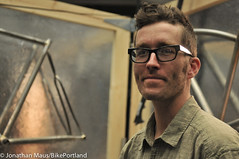
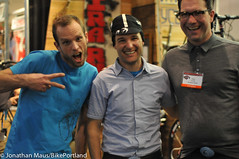
(Photos © J. Maus/BikePortland)
As you pedal north from the Rose Quarter into Portland’s “fifth quadrant,” it would be easy to not even notice what has become the densest area of small framebuilding shops anywhere in America. Ahearne Cycles, Ira Ryan Cycles, MAP Cycles, Periera Cycles and Signal Cycles all call North Portland home and operate their shops within four miles of one another. Despite the fact that all of the aforementioned builders are relatively young and have been building bikes professionally for less than ten years, they have made a big impact on the worldwide framebuilding scene with their award-winning bikes and unique approaches to the craft.
“We get together on bulk tubing orders, tooling, machinery, and kind of keep an eye out for each other. We go riding together and share shop space… It’s a way to keep costs down, keep the camaraderie and keep motivated too.”
— Rick Hunter, Hunter Cycles
“We all came up together and respect each other’s style,” builder Ira Ryan says. “We all depend on each other sometimes.” In addition to their individual achievements, the group of builders in North Portland is remarkable for the atmosphere of support, friendship and community they cultivate.
But this is far from a Portland phenomenon. Over several days of interviews at the recent North American Handmade Bicycle Show (NAHBS) in Sacramento, I learned that collaboration is common in other regions as well.
—
If this spirit of cooperation could be epitomized in one bike, the Ned Ludd Market Bike — created by Ira Ryan of Ira Ryan Cycles and Ben Leonard of Trucker Racks to meet the needs of Ned Ludd restaurant owner and head chef, Jason French — would be it. “We were both approached at the same time by Jason and it just grew out of that conversation,” Ryan says. “Once the collaboration really started, it was clear that the project was bigger than either of us could handle alone.”
Leonard designed and built the porteur-style front rack and the classic, yet innovative trailer, while Ryan constructed the bicycle frame with a similar blend of traditional lines and modern thinking. Their collaboration was certainly fruitful, as the Market Bike collected an award for “Best City Bike” at this year’s NAHBS. (More background on this bike here.)
The actual construction of the bike, rack and trailer was only part of the process. French, Leonard and Ryan would need help from other Portland-based companies in order for the complete bike to blossom. Tanner Goods provided a custom bag for the front rack and a roll-top cover for the trailer — both handmade in Portland from waxed canvas and leather. The finish work was done by Coat, a custom paint and powdercoating shop opened by Sacha White of Vanilla Bicycles back in 2007. The component selection also draws heavily from the Portland bike industry, featuring four hubs, three headsets and a bottom bracket from Chris King Precision Components. King supplied specially made hubs for the trailer wheels, the only two of their kind in existence. Three fender-mounted taillights and a pair of leather handlebar grips from Portland Design Works round out the package.
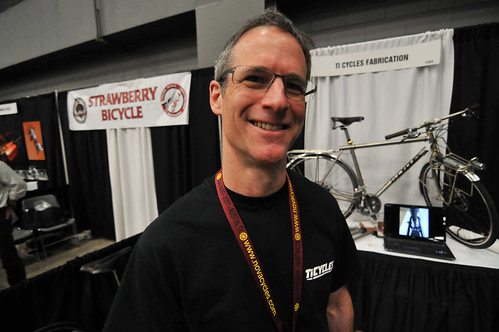
right when the current framebuilder wave was forming.
The conditions that have allowed this kind of cooperative, collaborative marketplace to take root and grow in Portland are described by Ti Cycles founder Dave Levy as a “perfect storm.” Framebuilder density, general bicycle interest and progressive attitudes toward local and sustainable living in a city that acknowledges bikes as a practical mode of transportation (and not just a recreational toy) are all contributing factors.
“I feel like I got really lucky when I moved into Portland because it was when this whole thing was starting… As far as bringing up the visibility of handcrafted bikes… I got lucky to be there at the right time.”
— Dave Levy, Ti Cycles
Levy moved his shop from Seattle to Portland in 2002 and sees the move as a fortuitous one. “I feel like I got really lucky when I moved into Portland because it was when this whole thing was starting… As far as bringing up the visibility of handcrafted bikes… I got lucky to be there at the right time.” Since then, the handmade bicycle scene has exploded in Portland and across the country. Nearly 40 shops are currently building bicycles by hand in the Portland area and that number continues to grow.
In addition to their friendly and informal cooperation, the builders in Portland and the rest of Oregon are organized under the banner of the Oregon Bicycle Constructor’s Association (OBCA), a non-profit trade organization formed in 2006. Levy, the current president of the OBCA, sums up the association’s mission: “We do what we can so that people feel like the business of framebuilding is collaborative… to make it so that it’s more of an open book, less of a closed community.” The OBCA is also invested in “promoting the brand of Oregon in bicycle construction,” and facilitating cooperation between builders who might not be in close proximity.
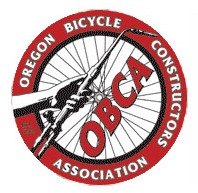
To further these goals and provide a launch pad for new Oregon builders, the OBCA has helped organize the annual Oregon Handmade Bicycle Show (this year’s edition will be held in Portland on October 13 and 14th). The OBCA also made attending this year’s NAHBS easier for its members by reserving a block of exhibitor spaces and footing the bill for electrical hookups that allowed builders to show off their bikes under proper lighting at no extra expense. The OBCA may be the only organization of its kind in the world and has done a great deal to grow the craft in Oregon and nationwide.
One could easily come to the conclusion that this phenomenon of cooperation and collaboration among framebuilders is unique to Portland. After all, the city is a mecca for young, creative bicycle lovers from across the globe. The United Bicycle Institute’s Portland campus is one of the only schools in the country offering framebuilding classes and several of the newer Portland builders are UBI graduates who chose to settle in town. In a city obsessed with locally made products and where more people are riding bikes with each passing year, the market seems ripe for talented, enthusiastic young framebuilders to make their mark.
However, as the view of the framebuilding community broadens, the truth becomes clear. Portland may have a unique mentality and attitude in its community of builders, but collaboration and cooperation in the trade is nothing new. Groups of builders in other areas have different challenges to overcome and strengths to share, but they all seem to embrace the idea that they are better off working together than in competition.
A particularly close-knit group of builders is centered around the Bay Area in Northern California. No fewer than nineteen builders from Northern California attended this year’s NAHBS in Sacramento, and many of them appeared like a group of old friends, migrating in and out of each other’s booths, admiring bikes and sharing laughs. Elder statesmen Bruce Gordon and Paul Sadoff have both been building bikes for well over thirty years and there are a solid handful of builders with ten and twenty years of experience.
One might think that these seasoned constructors would be reluctant to share the secrets they’ve learned over the years, but it appears the opposite is true.

(Santa Cruz County).
“The Bay Area has always had a strong builder presence,” says Rick Hunter, who resides in Santa Cruz County and built his first bike 20 years ago. Hunter’s experience tells him that the community of framebuilders in his area has, “always been pretty open.” Hunter sees specialization as a key component in their ability to cooperate. “We each have our own little niche,” he says. “We’re all making something that’s slightly different.” The proximity of the Bay Area builders allows them to work together in ways more isolated builders simply can’t. “We get together on bulk tubing orders, tooling, machinery, and kind of keep an eye out for each other. We go riding together and share shop space,” Hunter says. “It’s a way to keep costs down, keep the camaraderie and keep motivated too.”
Todd Ingermanson of Black Cat Bicycles, another Santa Cruz County builder, says that he and the other local builders “realized that we’re stronger together,” and are committed to keeping the community of builders strong and elevating the profile of their craft. “If you can keep a strong scene,” he says, “then there are plenty of bikes for everyone to build.”
The open attitude adopted by the Bay Area and Northern California builders seems to be paying off. Young builders like Joshua Muir of Frances Cycles (who also attended the 2011 Oregon Manifest with his SmallHaul cargo bike) are getting a good start and senior builders like Hunter are having no trouble keeping their order books full. “The demand is high enough at this point where I don’t feel like I’m getting undercut or feel like I’m losing out to other builders,” says Hunter. “I feel like I have all the work I can handle.”
Common sense would dictate that an area like Northern California that has such a long history in bicycle construction would have a well-developed network of builders, but the mentality of cooperation rather than competition has even crossed over the Rocky Mountains to permeate the far-flung mountain towns of Colorado. One group of builders dedicated to keeping the framebuilding trade open and friendly all make their living building bikes in Fort Collins. Black Sheep Bikes, Boo Bicycles, Panda Bicycles and Yipsan Bicycles all hail from the small college town.
Renold Yip of Yipsan has been building bikes in Fort Collins since 2006. He feels fortunate to live in an area where, “it doesn’t snow too much” and other small frame shops are nearby. “Yeah, it’s a good community,” he says. “It’s great to have James and Black Sheep just two or three miles away.” As a new builder and someone working with more traditional materials and methods of construction, Yip doesn’t have a shop full of power tools and big, expensive machines, so he has often uses tooling at Black Sheep Bikes when he needs to do a job faster than he can do it by hand. “We see Renold around town a lot,” says Todd Heath of Black Sheep. “I think everybody kind of looks out for each other. If you’re in a pinch… you can give somebody a call. It’s not this line of competition.”
“We try to push the smaller guys as much as we can and hopefully further everyone else. The more bikes built in Fort Collins the better it’ll be for everyone.”
— Todd Heath, Black Sheep Bikes
The builders in Fort Collins have also thoroughly embraced exotic and non-traditional frame materials, further preventing them from stepping on one another’s toes. Three of the four represented at NAHBS are working in different materials: Yip in steel, Black Sheep in titanium and Boo and Panda in bamboo. Even the two bamboo builders use different methods of joining their frames (Panda bonds their bamboo tubes into steel lugs where Boo wraps their junctions in layers of carbon fiber and resin).
Yip has found himself in the enviable position of being “the main guy [in Fort Collins] doing lugged steel, fillet brazed, traditional methods.” In contrast to Portland, where Yip says there are “like two handfuls” of steel builders; in Fort Collins “most of [the other builders] are doing bamboo or Ti material, so we don’t have overlap.” While the difference in their choice of materials may prevent direct collaboration, the builders in Fort Collins aren’t short on cooperation. “We try to push the smaller guys as much as we can and hopefully further everyone else,” Heath says. “The more bikes built in Fort Collins the better it’ll be for everyone.”
Despite this attitude, the builders in Colorado may find themselves limited by their geographic isolation. High in the Rocky Mountains and a long way from either coast, they often have a difficult time reaching a broader audience with their bikes. They need opportunities to show off their work, to promote their brands on a larger stage and grow their businesses. Black Sheep and YipSan have been regular exhibitors at the Rocky Mountain Bicycle Festival (RMBF), which has taken place every year since 2008. “We’ve been going to that the past four years,” says Black Sheep’s Heath. “That was something I was pretty excited about.” Yip has attended three of the four shows and remembers the festival as “a good gathering,” though he feels that “Colorado can do more” to promote the craft of framebuilding in the Centennial State.
Although not on the scale of NAHBS, the RMBF has drawn builders from far outside Colorado (Bilenky Cycle Works travelled from Philadelphia to exhibit in 2009) and provides a showcase for smaller, Colorado-based builders who may not be able to fund a trip to the national show. “It’s a big jump,” Heath says. “It’s not just the cost of the booth, but all the travel, the time away from work, it’s a very expensive trip. To Don’s [Don Walker, NAHBS president] credit, what he puts together and all the attention an the media and what he brings here is absolutely positive.” Naturally, they’re all looking forward to NAHBS 2012 in Denver. Yip says that builders who haven’t yet made the trip to NAHBS “have no excuse this time.”
Despite Colorado’s relative isolation, the framebuilding scene has a long history and its share of pioneers. As Black Sheep builds their bicycles exclusively from titanium, it’s no surprise that Todd Heath holds Kent Eriksen in high esteem. “He’s the godfather of Ti, in my mind anyway. He’s always been someone I looked up to, someone that has a really high standard.” Eriksen started Moots in 1980 to build the groundbreaking early mountain bikes that would eventually garner him a spot in the Mountain Bike Hall of Fame. He switched from steel to titanium construction in 1991 and has never looked back. After 25 years at Moots, he struck out on his own in 2005 to work in a smaller shop, focus on custom work and build tandems. Even though he operates his own Steamboat Springs shop in close proximity to Moots’ headquarters, Eriksen maintains that there is no bad blood or ill will from the split. “We have a great relationship, actually. Though we do tease each other a little bit,” he says. Since his name is nearly synonymous with the company he founded, Moots and Eriksen Cycles are inextricably linked. Eriksen sees this as a positive. “Any time I get press it’s good for them. Whenever they get press I think it’s good for me.”
Rather than embracing the shortsighted goal of selling more of their own bikes by undercutting and competing with one another, they work together to promote the industry in general and grow the market for their products so everyone has work to do and bikes to build.
Regardless of their geographic location, small builders like Eriksen who choose to work in titanium are forced to cooperate by the very nature of their material. High-quality steel tubing can be purchased in small quantities from several different suppliers, but only two American companies produce the “high-tech, aerospace titanium” that Eriksen specifies. “Ti is hard to buy,” he says. “We actually have to order a year in advance… and we have to buy a ton, like 500 to 1000 feet. I can’t really absorb all that cost.” To spread the huge bill for these large tubing orders, Eriksen shares tubing orders with titanium builders all across the US. Currently, he has an order on the way that will supply Funk Cycles, Steve Potts Bicycles, Holland Cycles, and even Independent Fabrications on the east coast in addition to his own shop. Because of this, the small builders who are working in the very same niche — building high-performance titanium bikes — are forced to cooperate and work together in a unique way to make their livelihood.
Even though the market for handmade bikes is relatively small, builders across the country have discovered they’re better off working together than competing with one another. Rather than embracing the shortsighted goal of selling more of their own bikes by undercutting and competing with one another, they work together to promote the industry in general and grow the market for their products so everyone has work to do and bikes to build.
As the tide continues to rise in this industry, Oregon builders are poised to do great things. When asked what sets Oregon builders apart from the rest, Ira Ryan says with a smile, “We drink better coffee and know how to build a killer city bike. I think we are maturing with regard to craft, business and overall style… I see a lot of potential for the Oregon builders.”
As the costs of overseas production goes up, this cooperative approach will continue to help small builders carve out a viable share of the market. With a solid generation of young, innovative builders and a support structure in place to promote their work, the potential for growth in the handmade bike market — with Portland at its epicenter — is nearly limitless.
This story was written by conributor Ryan King as part of our 2012 NAHBS coverage.




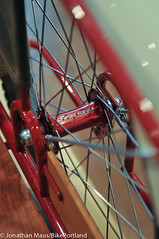
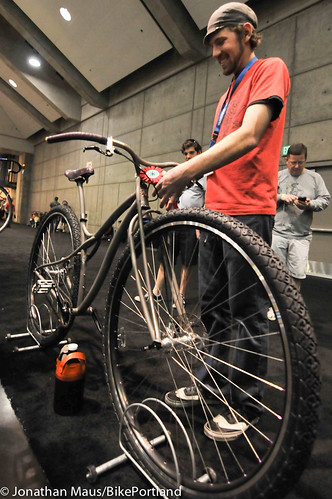
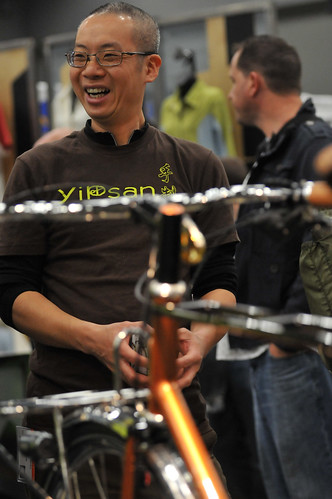
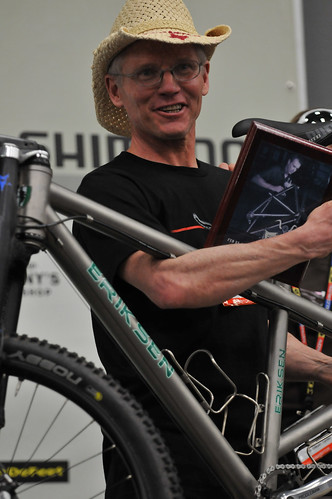

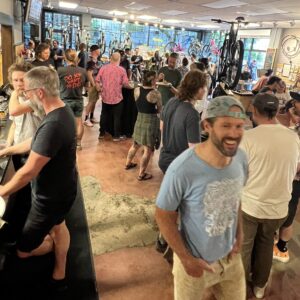

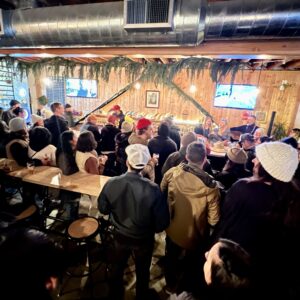
Thanks for reading.
BikePortland has served this community with independent community journalism since 2005. We rely on subscriptions from readers like you to survive. Your financial support is vital in keeping this valuable resource alive and well.
Please subscribe today to strengthen and expand our work.
Nearly 40 bike builders in Portland, wow. That means almost as many local builders as local brewers. Is this a great town or what!!!
Well…on the upside, at least I can afford the local beer.
Well, there might technically be 40 handmade bike brands based here in Portland, but it’s important to realize that the number that are actually making a viable business is much smaller. I don’t people to get the wrong idea, but it’s not like every builder is doing awesome and swimming in orders for new bikes. It’s a tough business. Some builders have closed, others have moved on to other jobs, and others are building for someone else or a larger company.
Aren’t Sugar Wheels and Sweetpea right in that bike-dense area too?
Events like the NAHBS are great venues for cross-pollination. With so many builders living & creating in a few small areas, it would be natural for local styles to evolve. Shows like this one help to spread the local ideas and thereby trigger new ideas in other builders. Wonderful!
This is such a great article Jonathan. I can definitely attest to it’s truth. I’ve had the best time getting to know many of the builders from around the country. The respect and unique camaraderie so many of the builders have for one another is something I’ve admired for a long time. As the industry has grown, the camaraderie has only grown with it – from being predominantly regional to far more widespread. Custom frame building may involve only one maker but the bond they have with their customers and the builder community fuels them – keeps them part of something collectively bigger. Collaboration seems like such a natural part of that growth. Awesome!